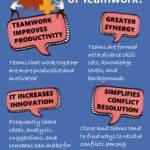
Sport means working as a team
Sport mean working as a team because team sports replicate many of the experiences that can be found in a typical work environment. For example, you have a team leader, who would be the captain or coach of your team, and then you have teammates, who may play a different role than you, but they all have the same goal.
Teamwork inspires people to contribute their fair share of effort, enabling a group of different individuals to come together to accomplish its overall objective.
Being an effective teammate both on and off the pitch requires good communication, self-discipline, decision-making, and accountability. Below we explore each of these soft skills in more detail and how they relate to sport and employability.
Communication
One of the most important skills that a young person can acquire is how to communicate effectively. A young athletes’ participation in sports strengthens their communication and listening abilities via interactions with teammates and following directions from a coach.
In any job, employees that can successfully interact with co-workers, supervisors, and customers are always an asset to a company, and this ability may frequently distinguish job candidates from their competition. At all levels of an organisation, effective communication is crucial to increasing productivity and sustaining healthy working relationships.
Self-discipline
In sports, while natural talent is important, it can only take you so far. When asked about the key to their success, countless athletes mention self-discipline, and all for good reason.
To become a skilled athlete requires hard work, and hard work takes discipline. Self-discipline will help you succeed in any occupation. Almost all employers look for candidates with these qualities since these are what make you dependable.
A few examples of self-discipline skills include planning, time management, and focus. You can maintain your focus in the face of hurdles, diversions, or even just a lack of motivation if you have self-discipline.
In sports, you learn self-discipline by committing to your chosen activity, showing up to practice (even when you might not want to), and focusing on being the best version of yourself.
Decision Making
Should you pass or shoot? Play attacking or defensively? Making decisions are essential in sport, and quick, decisive decision-makers tend to dominate the course of a game or match and feel in control and confident.
Sports provide a setting where participants may learn to control their innate “fight or flight” response and make rational decisions under duress. This capacity for functioning under pressure makes a person better at meeting deadlines and performing under pressure in the future.
Naturally, various employers look for different things, but almost all businesses want employees who can make decisions effectively. That’s because every person must make judgments at work every day, both big and small.
Accountability
Accountability motivates players to work toward the team’s success rather than only thinking about themselves. In a workplace environment, accountability refers to turning up on time, collaborating well with other employees, maintaining a consistent quality of work, and completing all the assigned tasks.
Using sport to teaching young people personal responsibility helps them understand that mistakes can happen, and that it’s crucial to learn how to correct them in a safe environment. Accountability, whether in sports or work, also means setting your own goals and working towards them, because you are in control of your own future.
(Reference: https://www.streetleague.co.uk/news/teamwork-and-sports)


